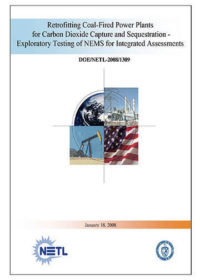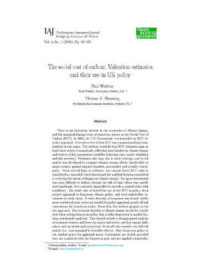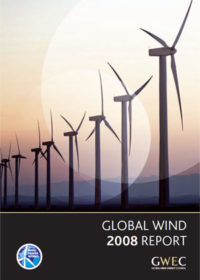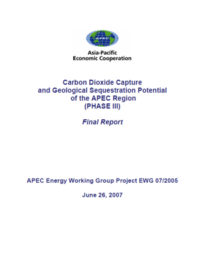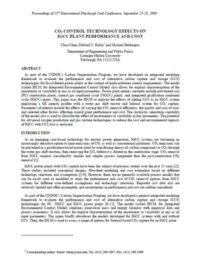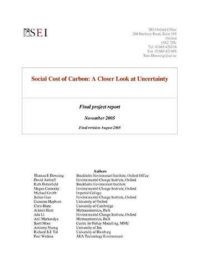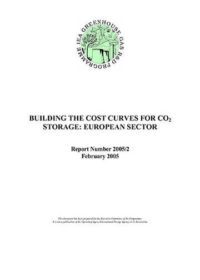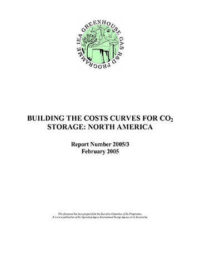Resources
Publications
Our publications, reports and research library hosts over 500 specialist reports and research papers on all topics associated with CCS.
View our Publication Library Disclaimer.
Filter by
Retrofitting coal-fired power plants for carbon dioxide capture and sequestration: exploratory testing of NEMS for integrated assessments
18th January 2008
Topic(s): Carbon capture use and storage (CCUS), CO2 capture, Economics
Disclaimer
The content within the Global CCS Institute Publications, Reports and Research Library is provided for information purposes only. We make every effort and take reasonable care to keep the content of this section up-to-date and error-free. However, we make no claim as to its accuracy, currency or reliability.
Content and material featured within this section of our website includes reports and research published by third parties. The content and material may include opinions and recommendations of third parties that do not reflect those held by the Global CCS Institute.
The social cost of carbon: valuation estimates and their use in UK policy
1st January 2008
Topic(s): Economics, Social cost
Disclaimer
The content within the Global CCS Institute Publications, Reports and Research Library is provided for information purposes only. We make every effort and take reasonable care to keep the content of this section up-to-date and error-free. However, we make no claim as to its accuracy, currency or reliability.
Content and material featured within this section of our website includes reports and research published by third parties. The content and material may include opinions and recommendations of third parties that do not reflect those held by the Global CCS Institute.
This is the fourth annual report on the status of the global wind industry by the Global Wind Energy Council, and it provides a comprehensive snapshot of this global industry - present in more than 70 countries. The data and country profiles for this report have been collected through GWEC’s member associations and companies around the world, as well as from other analysts and government contacts.
Disclaimer
The content within the Global CCS Institute Publications, Reports and Research Library is provided for information purposes only. We make every effort and take reasonable care to keep the content of this section up-to-date and error-free. However, we make no claim as to its accuracy, currency or reliability.
Content and material featured within this section of our website includes reports and research published by third parties. The content and material may include opinions and recommendations of third parties that do not reflect those held by the Global CCS Institute.
Expert workshop on financing carbon capture and storage: Barriers and solutions
1st July 2007
Topic(s): Carbon capture use and storage (CCUS), Economics
The CCS Expert Meeting on Finance took place over two days in London. The Meeting was by invitation only and limited to 80 people that included representatives from Governments, industry, the financial sector academia and research organizations.
The main purpose of the conference was to provide a clearer picture of the options available to finance CCS projects and to increase the involvement of experts from the financial sector and to discuss financial instruments with industry and Government representatives. The ultimate outcome of this work will be to identify, encourage and develop world-wide collaboration and practical development of financial mechanisms to accelerate the progression of CCS projects from R&D to commercial reality.
.
Disclaimer
The content within the Global CCS Institute Publications, Reports and Research Library is provided for information purposes only. We make every effort and take reasonable care to keep the content of this section up-to-date and error-free. However, we make no claim as to its accuracy, currency or reliability.
Content and material featured within this section of our website includes reports and research published by third parties. The content and material may include opinions and recommendations of third parties that do not reflect those held by the Global CCS Institute.
Carbon dioxide capture and geological sequestration potential of the APEC region (phase III): final report
26th June 2007
Topic(s): Carbon capture use and storage (CCUS), Economics
The purpose of this project (phase III) was to increase the capacity, expand the knowledge and awareness of APEC economies (China and Mexico) to assess the potential of CCS technologies within their own economies, evaluate the options and implement successful CCS initiatives.
Disclaimer
The content within the Global CCS Institute Publications, Reports and Research Library is provided for information purposes only. We make every effort and take reasonable care to keep the content of this section up-to-date and error-free. However, we make no claim as to its accuracy, currency or reliability.
Content and material featured within this section of our website includes reports and research published by third parties. The content and material may include opinions and recommendations of third parties that do not reflect those held by the Global CCS Institute.
CO2 control technology effects on IGCC plant performance and cost
25th September 2006
Topic(s): CO2 capture, Economics
Disclaimer
The content within the Global CCS Institute Publications, Reports and Research Library is provided for information purposes only. We make every effort and take reasonable care to keep the content of this section up-to-date and error-free. However, we make no claim as to its accuracy, currency or reliability.
Content and material featured within this section of our website includes reports and research published by third parties. The content and material may include opinions and recommendations of third parties that do not reflect those held by the Global CCS Institute.
Social cost of carbon: a closer look at uncertainty
1st November 2005
Topic(s): Economics, Social cost
Disclaimer
The content within the Global CCS Institute Publications, Reports and Research Library is provided for information purposes only. We make every effort and take reasonable care to keep the content of this section up-to-date and error-free. However, we make no claim as to its accuracy, currency or reliability.
Content and material featured within this section of our website includes reports and research published by third parties. The content and material may include opinions and recommendations of third parties that do not reflect those held by the Global CCS Institute.
Building the cost curves for CO2 storage: European sector
17th February 2005
Topic(s): CO2 storage, Economics
The IEA Greenhouse Gas R&D Programme (IEA GHG) has been systematically evaluating the cost and potential for reducing emissions of greenhouse gases arising from anthropogenic activities, especially the use of fossil fuels. A mitigation technology that has been given particular attention is the capture and storage of CO2 originating from large stationary point sources. To date a series of studies have been undertaken, on a range of options for the storage of carbon dioxide.
This report reviews the development of a CO2 storage cost curve for Europe. The study has been carried out by The Netherlands Geological Survey (TNO-NITG) in co-operation with the geological surveys of Britain (BGS) and Denmark and Greenland (GEUS) and ECOFYS.
Disclaimer
The content within the Global CCS Institute Publications, Reports and Research Library is provided for information purposes only. We make every effort and take reasonable care to keep the content of this section up-to-date and error-free. However, we make no claim as to its accuracy, currency or reliability.
Content and material featured within this section of our website includes reports and research published by third parties. The content and material may include opinions and recommendations of third parties that do not reflect those held by the Global CCS Institute.
Building the cost curves for CO2 storage: North America
1st February 2005
Topic(s): Carbon capture use and storage (CCUS), CO2 storage, Economics
Disclaimer
The content within the Global CCS Institute Publications, Reports and Research Library is provided for information purposes only. We make every effort and take reasonable care to keep the content of this section up-to-date and error-free. However, we make no claim as to its accuracy, currency or reliability.
Content and material featured within this section of our website includes reports and research published by third parties. The content and material may include opinions and recommendations of third parties that do not reflect those held by the Global CCS Institute.
